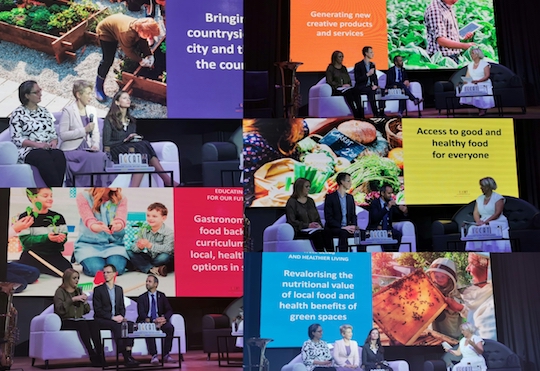Policies and practices from the European Regions of Gastronomy that support local greener and healthier development as well as highlight the vital role of local gastronomy in sustainable growth, were the focus of this year’s round table organised by the International Institute of Gastronomy, Culture, Arts and Tourism (IGCAT) in Brussels, on 9 October 2019.
IGCAT and the European Regions of Gastronomy celebrated their commitment to preserve and promote cultural and food uniqueness through sustainable initiatives during the Greener and Healthier Futures round table which was a European Week of Regions and Cities official side event.
Focus areas including Feeding the Planet; Innovation, Creativity and Job Opportunities; Educating for our Future; Balanced and Sustainable Tourism; Linking Urban and Rural; Well-being and Healthier Living were explored during moderated discussions with key policy-makers and experts from awarded and candidate European Regions of Gastronomy.
Moderated by President of IGCAT, Dr. Diane Dodd, the event was opened by Milosz Momot, Deputy Head of the Tourism, Emerging and Creative Industries Unit of DG GROW. He congratulated the European Region of Gastronomy initiative for contributing to the promotion of gastronomy and responsible tourism in Europe, and welcomed the project’s approach based on cross-sectoral cooperation, knowledge-exchange and sustainability enhancement.
The first session focused on Legacy and Food Futures and included interventions from Executive Director of PRODECA, Ramon Sentmarti (Catalonia, European Region of Gastronomy awarded 2016); Special Advisor to Business Region Aarhus, Jesper Christensen (Aarhus-Central Denmark, European Region of Gastronomy awarded 2017); and Head of Department of Culinary Arts and Service Industries at Galway International Hotel School – GMIT, Jacinta Dalton (Galway-West of Ireland, European Region of Gastronomy awarded 2018).
The Quest for Health and Well-being was the theme of the second session, discussed by Executive Director of South Aegean, European Region of Gastronomy awarded 2019, Heidi Lazani; Councillor for International Relations at Sibiu County Council, Doris Banciu (Sibiu, European Region of Gastronomy awarded 2019); and International Executive Director of ProAgria East Finland, Ilona Sares (Kuopio, European Region of Gastronomy awarded 2020.
Elected representatives provided a political perspectives in the third session about Landscape, Well-being and Culinary Cultures. Ambassador for Minho In, Francisco de Calheiros (Minho, European Region of Gastronomy awarded 2016) noted the interesting trend towards walking and food tourism; State Secretary of Slovenia, Eva Štravs Podlogar (Slovenia, European Region of Gastronomy awarded 2021) shared ideas and perspectives on the urgent need to incentivize young people to take up farming. Candidate region representative by Director of Planning and Development at Trøndelag County, Kirsten I. Værdal (Trondheim- Trøndelag, European Region of Gastronomy candidate 2022); and Director of Tourism of Menorca, Jesús Gomila (Menorca, European Region of Gastronomy candidate 2022) then highlighted their on regions challenges and declared their eagerness to learn from the other Platform members.
IGCAT’s proposal to create a Fund for Local Arts and Gastronomy (FLAG) to support culture and food related initiatives in lesser economically developed regions. Was announced and this initiative is planned to be fully launched by the end of the year.
The Greener and Healthier Futures event was closed by First Vice-Chairman of the SEDEC Commission of the European Committee of the Regions, Alin-Adrian Nica who recognised that gastronomy is an important part of culture and an essential asset for tourism, and should be thus considered as a priority in regional sustainable development strategies.
The round table was followed by Menorca’s and Trondheim-Trøndelag bid presentations for the European Region of Gastronomy 2022 title.
About the European Region of Gastronomy
Candidate and awarded Regions of Gastronomy from Europe, guided by IGCAT, are working together to raise awareness about the importance of their cultural and food uniqueness; stimulate creativity and gastronomic innovation; educate for better nutrition; improve sustainable tourism standards; highlight distinctive food cultures; and strengthen community well-being.
About IGCAT
IGCAT aims to empower local communities by raising awareness of the importance to safeguard and promote distinct food, culture, arts and sustainable tourism assets. This is essential to balance against globalised food trends that are impacting on our planet, health and local economies.
IGCAT is a non-profit institute established in 2012, working with regional stakeholder consortiums in the fields of gastronomy, culture, arts and tourism. It counts on the expertise of a worldwide network of experts and works in partnership with specialised intergovernmental organisations.
IGCAT provides the Region of Gastronomy Award and is the official secretariat for the European Region of Gastronomy Platform. Furthermore, the Institute has developed the European Young Chef Award the Local Food Gift Challenge, the Top Visitor Experience and the Food Film Menu.
11 October 2019
